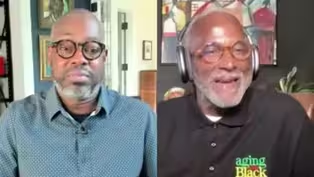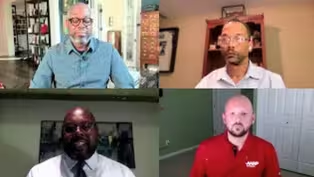
‘100 Caring Congregations’ initiative provides training and resources to church leaders
Clip: Season 53 Episode 28 | 7m 16sVideo has Closed Captions
100 Caring Congregations project trains Black church leaders to be caregiving advocates.
“American Black Journal” host Stephen Henderson gets details on 100 Caring Congregations, a new initiative helping to create caregiving leaders and ministries in Detroit's Black churches. Henderson talks with the project’s director, Dr. Marilyn French Hubbard. Plus, he talks with two of its participants, Rev. Brenda Jones and Andrew Jackson of Oak Grove AME Church.
Problems playing video? | Closed Captioning Feedback
Problems playing video? | Closed Captioning Feedback
American Black Journal is a local public television program presented by Detroit PBS

‘100 Caring Congregations’ initiative provides training and resources to church leaders
Clip: Season 53 Episode 28 | 7m 16sVideo has Closed Captions
“American Black Journal” host Stephen Henderson gets details on 100 Caring Congregations, a new initiative helping to create caregiving leaders and ministries in Detroit's Black churches. Henderson talks with the project’s director, Dr. Marilyn French Hubbard. Plus, he talks with two of its participants, Rev. Brenda Jones and Andrew Jackson of Oak Grove AME Church.
Problems playing video? | Closed Captioning Feedback
How to Watch American Black Journal
American Black Journal is available to stream on pbs.org and the free PBS App, available on iPhone, Apple TV, Android TV, Android smartphones, Amazon Fire TV, Amazon Fire Tablet, Roku, Samsung Smart TV, and Vizio.
Providing Support for PBS.org
Learn Moreabout PBS online sponsorship- A Detroit family care caregivers initiative called 100 Caring Congregations is creating caregiving ministries in Detroit's Black churches to help congregants prepare and plan for roles as family caregivers.
The project is funded by the Ralph C. Wilson, Jr. Foundation and it trains faith leaders and church members on how to provide guidance on topics like self-care, accessing resources, and having difficult conversations about death and dying.
Joining me now is the project's director, Dr. Marilyn French Hubbard, along with two participants from Oak Grove AME Church, Reverend Brenda Jones, who's the Minister of Pastoral Care, and Andrew Jackson, who is a church member.
Welcome to all of you.
- Good evening.
Good evening.
- Good evening.
- Good evening.
- It's great to have you here.
So, Dr. Hubbard, I'm going to start with you.
Explain what 100 Caring Congregations is and kind of where you are with the project.
- Well, our 100 Caring Congregations has evolved to a wonderful network of 100 trained ministry leaders that are managing and creating caregiving ministries within their churches.
So, we started out, really, with just an idea and we had to go to local churches, and we got almost 50 pastors to say yes to the program.
And so, we're in the churches, the ministries have started, and we trained these leaders.
We're calling them legacy leaders.
And so what's happening there is the goal of the program is to help change the current condition of caregiving and to help to provide resources to caregivers and their families within congregations.
And so the first thing that had to happen was a point of contact.
You know, who's going to lead these ministries?
And then what we had to do was to determine whether or not the culture was right within the churches, because many times we're not talking about death and dying.
So, we're looking at the realities of aging, growing older, and some of the things that are likely to happen as we age, which is caregiving, perhaps disability, perhaps end of life, and as well as look at our own mortality.
- So, Reverend Jones, you went through this project's training.
Tell us what that was like and how you shared this information at the Oak Grove AME.
- Well, thank you for having me.
This program was so needed.
I was struggling as the Minister of Pastoral Care to respond to that panicked phone call from a member saying, "They're going to discharge my mom from the hospital, but she can't go home.
What do I do?"
Or the family member that I encountered a couple years ago who...
I was in the vestibule of the church and she came out of the sanctuary and pretty much collapsed in my arms.
And when I probed into what was going on, she had been caring for her husband, caring for her mom, caring for her aunt, and the weight of caregiving was more than she could handle.
She was an only child of an only child.
And so, the burden was horrendous.
And when we looked around our congregation, we realized there were a number of things missing.
One of them was education.
And then along came Dr. Hubbard with a phenomenal program to assist churches in providing education.
So, this program has meant a lot because now I have tools that I can use within my congregation to talk about those sensitive subjects that we all need to talk about but perhaps don't have the tools to start the conversation or the resources and connections.
And that's the other thing that's been birthed out of this program.
I have 100 other people I can call on who may have had experiences that I haven't had yet but they have.
And therefore, I can tap into our community, our village, and say, "Does anyone know of a resource for this or for that?"
And as we say sometimes, I may not know, but I know somebody who knows.
- "I know someone who knows."
Right?
- Yes, yes, yes.
- Andrew, I know you have a personal caregiving story to tell.
We want to to hear that first, but I also want to have you talk specifically about how being part of this training at Oak Grove has changed that experience for you.
- Thank you again for having me here this evening.
It's changed me in the sense that I am now taking better care of myself in terms of trying to get adequate sleep.
I just joined a dance class at church, ballroom dancing, to get some exercise and some movement in.
And even though I have two left feet, I really have benefited from that program.
But the training has just alerted me to things that I need to take care of to make sure that I am in a good physical and mental place to take care of my mother on a daily and recurring basis.
- Can you talk about the care that you're giving for your mom, how long you've been doing that, and sort of the journey that you've been on?
- Yes.
My mother fell and broke a hip and June of 2022.
And when she was in the recovery process, we realized that she couldn't live on her own.
So, I bought her home in August of 2022 and she's been with me since then.
My wife of 45 years transpired transition in March of 2023, and she was assisting me in caring for my mother.
And since that time, I've had the majority of her care.
I do have a caregiver that comes in four hours each day to more or less get her bathed and dressed in the morning.
And then, from that point, I take care of the rest of her day.
'Aging While Black' Author Raymond Jetson discusses his new book and caring for Black elders
Video has Closed Captions
Clip: S53 Ep28 | 7m 53s | “Aging While Black” author Raymond Jetson talks about caregiving in the Black community. (7m 53s)
Financial, legal and self-care experts share resources available to Michigan caregivers
Video has Closed Captions
Clip: S53 Ep28 | 8m 43s | Financial, legal and self-care experts share resources available to Michigan caregivers. (8m 43s)
Providing Support for PBS.org
Learn Moreabout PBS online sponsorshipSupport for PBS provided by:
American Black Journal is a local public television program presented by Detroit PBS













